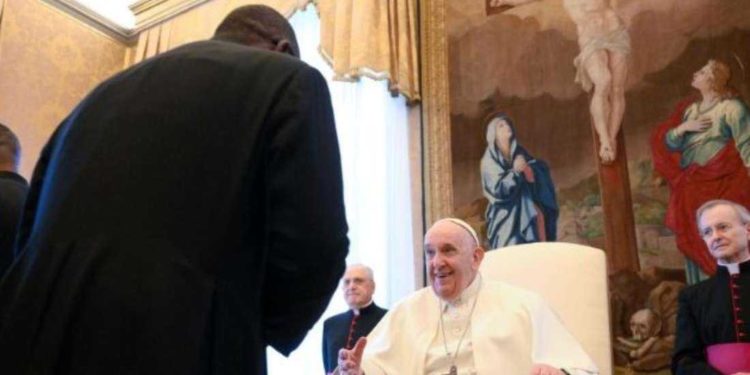Pope encourages liturgists to fight against ‘sloppy, neglected, poorly prepared’ Masses
Pope Francis with participants in the course for liturgists. (Photo: VATICAN MEDIA)
Religious celebrations must foster the “fruitful participation of the people of God” and not just of the clergy, Pope Francis said.
Speaking to diocesan liturgical directors Jan. 20, the pope said that beyond a “deep knowledge” of religious celebrations, experts on liturgy must have a strong pastoral sense to improve a community’s liturgical life.
A pastoral approach to the liturgy allows religious celebrations to “lead the people to Christ, and Christ to the people,” which the pope said is the “principal objective” of liturgy and an essential principle of the Second Vatican Council.


“If we neglect this, we will have beautiful rituals, but without vigor, without flavor, without sense, because they do not touch the heart and the existence of the people of God,” said Pope Francis.
The liturgical directors were in Rome to participate in a formation course on liturgy, “Living Liturgical Action Fully,” at the Pontifical Institute of Liturgy.
The pope encouraged them to spend time in parishes, observe liturgical celebrations and help pastors reflect on how they prepare liturgy with their communities.
If teachers of liturgy are “in the midst of the people, they will immediately understand and know how to accompany their brothers and sisters, how to suggest what is suitable and feasible to communities, and what the necessary steps are to rediscover the beauty of the liturgy and celebrating together,” he said.
The job of a diocesan liturgical director, said Pope Francis, is to offer parishes a liturgy “that is imitable, with adaptations that the community can take to grow in liturgical life.”
A liturgical director should not care about a parish’s liturgy only when the bishop comes to visit and then let the liturgy go back to how it was after he leaves, the pope said.
“To go to parishes and not say anything when faced with somewhat sloppy, neglected, poorly prepared liturgies means not helping the community, not accompanying them,” he added.
Referring to his apostolic letter “Desiderio Desideravi” published in June 2022, the pope explained that the best way to develop proper care for the liturgy is by allowing oneself to be formed by its frequent celebration.
Pope Francis also encouraged the establishment of liturgical formation schools in parishes.
As a piece of parting advice, the pope encouraged the liturgical directors to “care for silence,” especially before Mass, to help the assembly concentrate on what is about to occur.
“Often sacristies are noisy before and after celebrations, but silence opens one up and prepares one for mystery,” said Pope Francis. “We must rediscover and value silence.”
Latest News
Credit: Source link




